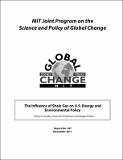The Influence of Shale gas on U.S. Energy and Environmental Policy
Author(s)
Jacoby, H.D.; O'Sullivan, F.M.; Paltsev, S.
DownloadMain article (776.6Kb)
Terms of use
Metadata
Show full item recordAbstract
The emergence of U.S. shale gas resources to economic viability affects the nation’s energy outlook and the expected role of natural gas in climate policy. Even in the face of the current shale gas boom, however, questions are raised about both the economics of this industry and the wisdom of basing future environmental policy on projections of large shale gas supplies. Analysis of the business model appropriate to the gas shales suggests that, though the shale future is uncertain, these concerns are overstated. The policy impact of the shale gas is analyzed using two scenarios of greenhouse gas control—one mandating renewable generation and coal retirement, the other using price to achieve a 50% emissions reduction. The shale gas is shown both to benefit the national economy and to ease the task of emissions control. However, in treating the shale as a “bridge” to a low carbon future there are risks to the development of technologies, like capture and storage, needed to complete the task.
Description
http://globalchange.mit.edu/research/publications/2219
Date issued
2011-11Publisher
MIT Joint Program on the Science and Policy of Global Change
Citation
report no. 207
Series/Report no.
Joint Program Report Series;207
The following license files are associated with this item: